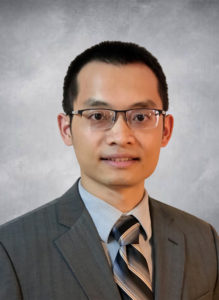
Ping He
Title(s):
Assistant Professor
Office
2243 Howe
537 Bissell Rd
Ames, IA 50011-1096
Information
Links:
Education:
Ph.D. Engineering Thermophysics, Chinese Academy of Sciences, 2012
B.S. Thermal Energy and Power Engineering, Sichuan University, 2007
Teaching:
AerE 362: Aerospace Systems Integration
AerE 463/563: Introduction to Multidisciplinary Design Optimization
Research Interests:
Multidisciplinary Design Optimization (MDO)
Machine Learning and Reduced-order Modeling
Computational Fluid Dynamics (CFD)
Aircraft and Turbomachinery Design
Spacecraft Mission Optimization
Sponsored Projects:
Six funded projects from federal agencies and the industry. Total funding: $1.97M. My share: $880K. The following are selected recent projects:
An Integrated Numerical and Experimental Study of Wind-Driven Water Film Flow Dynamics Pertinent to Wind Turbine Icing Phenomena. National Science and Foundation (NSF). Total award: $620K. 2024−2027. My role: PI. My share: $310K.
Accelerating Scientific Discovery: A Toolset for Standardizing Data Collection and Machine Learning. The Ames National Lab, Department of Energy (DOE). Total award: $330K. 2023-2025. My role: PI. My share: $100K.
High-fidelity Multidisciplinary Design Optimization of Heat Exchangers for eVTOL Aircraft Thermal Management. National Aeronautics and Space Administration (NASA). Total award: $100K. 2023-2025. My role: Science PI. My share: $100K.
Collaborative Research: Enabling Large-scale Multidisciplinary Design Optimization with Unsteady Simulations: A Hybrid Pseudo-spectral Approach. National Science and Foundation (NSF). Total award: $630K. 2022−2025. My role: PI of the lead institute. My share: $305K.
Publications
Selected Publications (of 62 papers including 28 journal and 34 conference papers. Google H-index: 18)
Fang, L, He, P. “A Duality-Preserving Adjoint Method for Segregated Navier-Stokes Solvers”. Journal of Computational Physics, 2024
Fang, L, He, P. “Field inversion machine learning augmented turbulence modeling for time-accurate unsteady flow”. Physics of Fluids, 2024.
Harris, G, He, P, Abdelkhalik, O. “Control Co-Design Optimization of Spacecraft Trajectory and System for Interplanetary Missions.” Journal of Spacecraft and Rockets, 2024.
Wang, J, Hu, H, He, P, Hu, H. “A Machine Learning Study to Predict Wind-Driven Water Runback Characteristics”. Physics of Fluids, 2023.
Li, Z., He, P. “Accelerating Unsteady Aerodynamic Simulations Using Predictive Reduced-order Modeling”. Aerospace Science and Technology, 2023.
Koyuncuoglu, H., He, P. “Simultaneous wing shape and actuator parameter optimization using the adjoint method”. Aerospace Science and Technology, 2022.
Secco, N., Kenway, G. K. W., He, P., Mader, C. A., Martins, J. R. R. A. “Efficient mesh generation and deformation for aerodynamic shape optimization”. AIAA Journal, 2021.
Du, X., He, P., Martins, J.R.R.A. “Rapid airfoil design optimization via neural network-based parameterization and surrogate modeling”. Aerospace Science and Technology, 2021.
He, P., Mader, C.A., Martins, J.R.R.A., Maki, K.J. “DAFoam: An open-source adjoint framework for multidisciplinary design optimization with OpenFOAM”. AIAA Journal, 58, pp. 1304-1319, 2020.
He, P., Mader, C.A., Martins, J.R.R.A., Maki, K.J. “Aerothermal optimization of a ribbed U bend cooling channel using the adjoint method”. International Journal of Heat and Mass Transfer, 140, pp. 152-172, 2019.
Kenway, G.K.W., Mader, C.A., He, P., Martins, J.R.R.A. “Effective adjoint approaches for computational fluid dynamics”. Progress in Aerospace Sciences, 110, p. 100542, 2019.
He, P., Mader, C.A., Martins, J.R.R.A., Maki, K.J. “An aerodynamic design optimization framework using a discrete adjoint approach with OpenFOAM”. Computers & Fluids, 168, pp. 285-303, 2018.